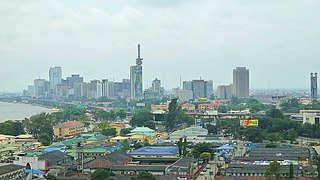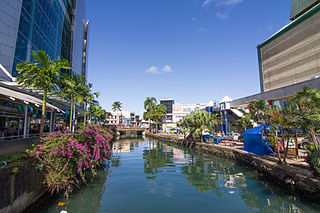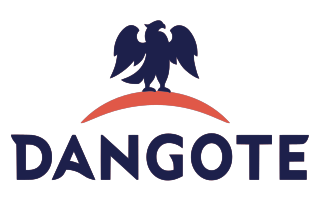Related Research Articles

The economy of Nigeria is a middle-income, mixed economy and emerging market with expanding manufacturing, financial, service, communications, technology, and entertainment sectors. It is ranked as the 39th-largest economy in the world in terms of nominal GDP, the largest in Africa and the 27th-largest in terms of purchasing power parity.

The economy of Fiji is one of the most developed among the Pacific islands. Nevertheless, Fiji is a developing country endowed with forest, mineral and fish resources. The country has a large agriculture sector heavily based on subsistence agriculture. Sugar exports and the tourism industry are the main sources of foreign exchange. There are also light manufacturing and mining sectors.

Agriculture is a sector of the Nigerian economy, accounting for up to 35% of total employment in 2020. According to the FAO, agriculture remains the foundation of the Nigerian economy, providing livelihoods for most Nigerians and generating millions of jobs. Along with crude oil, Nigeria relies on the agricultural products it exports to generate most of its national revenue. The agricultural sector in Nigeria comprises four sub-sectors: crop production, livestock, forestry, and fishing.

National Bank for Agriculture and Rural Development (NABARD) is an apex regulatory body for overall regulation of regional rural banks and apex cooperative banks in India. It is under the jurisdiction of Ministry of Finance, Government of India. The bank has been entrusted with "matters concerning policy, planning, and operations in the field of credit for agriculture and other economic activities in rural areas in India". NABARD is active in developing and implementing financial inclusion.

Agriculture in South Korea is a sector of the economy of South Korea. Korean agriculture is the basic industry of the Korean economy, consisting of farming, animal husbandry, forestry and fishing. At the time of its founding, Korea was a typical agricultural country, with more than 80% of the population engaged in agricultural production. After land reform under the Lee Seung-man administration, economic revitalization under the Park Chung-hee military government and the wave of world trade liberalization that began in the 1980s, Korean agriculture has undergone dramatic changes. Through the Green Revolution, Korea became self-sufficient in rice, the staple food, in 1978, and in 1996, Korea became the first Asian country after Japan to mechanize its agriculture with fine-grained cultivation. The development of Korean agriculture has also led to the development of agriculture-related industries such as fertilizer, agricultural machinery and seed.

Agriculture in Ghana consists of a variety of agricultural products and is an established economic sector, providing employment on a formal and informal basis. It is represented by the Ministry of Food and Agriculture. Ghana produces a variety of crops in various climatic zones which range from dry savanna to wet forest which run in east–west bands across Ghana. Agricultural crops, including yams, grains, cocoa, oil palms, kola nuts, and timber, form the base of agriculture in Ghana's economy. In 2013 agriculture employed 53.6% of the total labor force in Ghana.

The mining of minerals in Nigeria accounts for only 0.3% of its gross domestic product, due to the influence of its vast oil resources. The domestic mining industry is underdeveloped, leading to Nigeria having to import minerals that it could produce domestically, such as salt or iron ore. The rights to ownership of mineral resources is held by the Federal Government of Nigeria, which grants titles to organizations to explore, mine, and sell mineral resources. Organized mining began in 1903, when the Mineral Survey of the Northern Protectorates was created by the British colonial government. A year later, the Mineral Survey of the Southern Protectorates was founded. By the 1940s, Nigeria was a major producer of tin, columbite, and coal. The discovery of oil in 1956 hurt the mineral extraction industries, as government and industry both began to focus on this new resource. The Nigerian Civil War in the late 1960s led many expatriate mining experts to leave the country. Mining regulation is handled by the Ministry of Solid Minerals Development, who are tasked with the responsibility of overseeing the management of all mineral resources in Nigeria. Mining law is codified in the Federal Minerals and Mining Act of 1999. Historically, Nigeria's mining industry was monopolized by state-owned public corporations. This led to a decline in productivity in almost all mineral industries. The Obasanjo administration began a process of selling off government-owned corporations to private investors in 1999. The Nigerian Mining Industry has picked up since the "Economic Diversification Agenda", from Oil & Gas, to Agriculture, Mining, etc., began in the country.

The Dangote Group is a Nigerian multinational industrial conglomerate, founded by Aliko Dangote. It is the largest conglomerate in West Africa and one of the largest on the African continent. The group employs more than 30,000 people, generating revenue in excess of US$4.1 billion in 2017.

The Nigerian Economic Summit Group (NESG) is a non-profit, non-partisan, private sector organisation with a mandate to promote and champion the reform of the Nigerian economy into a modern, globally competitive, sustainable, inclusive, open economy.
The Communications Authority of Kenya (CA) is the regulatory authority for the ICT industry in Kenya with responsibilities in telecommunications, e-commerce, broadcasting and postal/courier services. The CA is also responsible for managing the country's numbering and frequency spectrum resources, administering the Universal Service Fund (USF) as well as safeguarding the interests of users of ICT services.

Olusegun Olutoyin Aganga is a Nigerian politician who served as the Minister of Industry, Trade, and Investment of Nigeria from 2011 to 2015. He was first nominated by President Olusegun Obasanjo and appointed by President Goodluck Jonathan as the Minister of Finance from 6 April 2010 to June 2011.
Ghana'sMinistry of Food and Agriculture (MOFA) is the government agency responsible for the development and growth of agriculture in the country. The jurisdiction does not cover the cocoa, coffee, or forestry sectors. The primary organisation and main area of the presidential administration of Ghana is the nation's Ministry of Food and Agriculture (MOFA), which is in charge of creating and carrying out policies and plans for the agricultural sector within the framework of an efficient national socio-economic development and prosperity agenda. The Ministry's plans and programmes are created, coordinated, and put into effect using frameworks for policy and strategy using a sector-wide approach. The Food and Agriculture Sector Development Policy II and the Medium Term Agriculture Sector Investment Plan were both developed with the aid of MOFA in relation to this.
The Nigerian Export Promotion Council (NEPC) was established through the promulgation of the “Nigerian Export Promotion Council Decree No. 26 of 1976”, now an Act in line with the democratic governance of the Country.
The Lagos State Ministry of Education is a state government owned ministry charged with the responsibility of planning and implementing the state policies on Education. Its vision is "to be a model of excellence in the provision of education in Africa". Its mission is to make high-quality education available to all learners through effective and efficient resource management, resulting in self-sufficiency and socioeconomic growth.

The National Environmental Standards and Regulations Enforcement Agency is an environmental agency of the Federal Government of Nigeria that was established by law in 2007 to "ensure a cleaner and healthier environment for Nigerians". The agency functions as a parastatal enterprise of the Federal Ministry of Environment, and it is headed by a director general, who is also the chief executive officer of about 483 companies in the NESREA corporate family. Human activities that have negative effects on the environment are covered by NESREA's 33 National Environmental Regulations. The agency's authority includes process and equipment monitoring, compliance with set standards, disciplining violators of set rules, conducting public investigations, and submission of proposals to the minister for review in order to maintain environmental quality.
National Skill Development Corporation (NSDC) is a not-for-profit public limited company incorporated on July 31, 2008, under section 25 of the Companies Act, 1956 (corresponding to section 8 of the Companies Act, 2013). NSDC was set up by Ministry of Finance as Public Private Partnership (PPP) model. The Government of India through Ministry of Skill Development & Entrepreneurship (MSDE) holds 49% of the share capital of NSDC, while the private sector has the balance 51% of the share capital.

The Federal Ministry of Petroleum Resources is a part of the Federal Ministries of Nigeria that directs petroleum resources and its activities in Nigeria. The President, Bola Tinubu is the current minister of petroleum.
Atmanirbhar Bharat, which translates to 'self-reliant India', is a phrase the Prime Minister of India Narendra Modi and his government used and popularised in relation to the country's economic development plans. The phrase is an umbrella concept for the Modi government's plans for India to play a larger role in the world economy, and for it to become more efficient, competitive and resilient.

Climate change in Nigeria is evident from temperature increase, rainfall variability. It is also reflected in drought, desertification, rising sea levels, erosion, floods, thunderstorms, bush fires, landslides, land degradation, more frequent, extreme weather conditions and loss of biodiversity. All of which continues to negatively affect human and animal life and also the ecosystems in Nigeria. Although, depending on the location, regions experience climate change with significant higher temperatures during the dry seasons while rainfalls during rainy seasons help keep the temperature at milder levels. The effects of climate change prompted the World Meteorological Organization, in its 40th Executive Council 1988, to establish a new international scientific assessment panel to be called the International Panel on Climate Change (IPCC). The 2007 IPCC's fourth and final Assessment Report (AR4) revealed that there is a considerable threat of climate change that requires urgent global attention. The report further attributed the present global warming to largely anthropogenic practices. The Earth is almost at a point of no return as it faces environmental threats which include atmospheric and marine pollution, global warming, ozone depletion, the dangers of pollution by nuclear and other hazardous substances, and the extinction of various wildlife species.
The Transmission Company of Nigeria (TCN) is a federal government owned electric utility company in Nigeria established in 2005. It is headquartered in the Federal Capital Territory in Abuja. It is a member of the West African Power Pool, an agency committed to improving energy flow across ECOWAS member states through joint financing between member countries for better sustainability of power projects within the region. It is in furtherance of this collective objective that the TCN provides bulk power supplies to countries like Republic of Niger, Republic of Benin and Togo.
References
- ↑ "Report Name: Sugar Annual" (PDF). Retrieved 29 October 2023.
- ↑ "National Sugar Development Council Act" (PDF). Retrieved 29 October 2023.
- ↑ "Rabiu urges FG to replicate the Nigerian Sugar Devt Council in the rice sector". Vanguard News. 8 February 2021. Retrieved 29 October 2023.
- ↑ Attah, Solomon (26 June 2022). "Nigeria's dependence on imported sugar threatens self-sufficiency". Businessday NG. Retrieved 29 October 2023.
- ↑ Feyisipo, Remi (7 September 2022). "Nigeria's sugar backward integration policy attracts N250bn investments". Businessday NG. Retrieved 29 October 2023.
- 1 2 Ogunyemi, Ifedayo (10 March 2022). "NSDC and Nigeria's strive to attain sugar self-sufficiency". Tribune Online. Retrieved 29 October 2023.
- 1 2 "What does the National Sugar Development Council do?". Daily Trust. 8 May 2023. Retrieved 29 October 2023.
- ↑ "FAO.org :". Home (in French). Retrieved 29 October 2023.
- 1 2 "National Sugar Development Council". National Sugar Development Council -. 2 December 2015. Retrieved 29 October 2023.
- ↑ "FG Seeks Govs' Support for Sugar Masterplan Implementation". THISDAYLIVE. 30 October 2022. Retrieved 29 October 2023.
- ↑ Egole, Anozie (31 October 2022). "NSDC seeks governors' support on sugar masterplan implementation". Punch Newspapers. Retrieved 29 October 2023.
- ↑ Faith, Adeoye (28 March 2021). "FG tasks NSDC on self-sufficiency in sugar production". Tribune Online. Retrieved 29 October 2023.